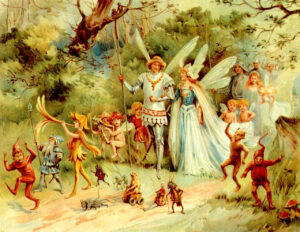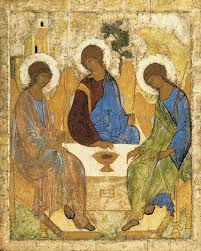
“Dear Santa, all I want for Christmas is to skip church. I’m too old for fairy tales.”
Fairy Tales?
A few years ago, along I-94 west of downtown Milwaukee, these words were on a billboard sponsored by a local atheist group. They appeared in other cities too. Well, it’s a free country. As you can see, the billboard got kind of faded and shabby with time. So likewise, I think, is the notion that Christmas was only a pretty fairy tale. We’ll come to that.
I am glad to have a few public challenges to the Christian Faith. We Americans live in a society where Christianity is not challenged; it is just increasingly ignored. Back in the old days (“Oh, here he goes again…”) the Christmas stories were just built into this time of year. Radio and television were filled with Christmas carols. Jack Benny was a Jew, but on his program Dennis Day sang “O Come, All Ye Faithful”, and “Ave Maria”. * There were also the secular Christmas songs: “White Christmas”, and “Winter Wonderland” and the like. They are lovely, but now they have almost crowded out any mention of Jesus’ birth. Even a railroad magazine I read, (speaking of the continuing popularity of trains at Christmas) mentioned, in passing, “the general shift from religious observance to commercial excess and party time”. “Faith-wise”, America is not so slowly becoming like Western Europe, where eighty years ago C S Lewis gathered much positive attention defending orthodox Christianity. Now hardly anybody cares.
- I know times have changed. America today is much more multi-cultural. So when Jewish and Muslim holidays come along, give them their time, too. What’s wrong with that? In respect to religion, however, the current tendency in our society is to turn “multi-cultural” into “non-existent”.

So I say: Bring it on, you atheists! Bring on some serious challenges to the Faith, to the Christmas stories. Fairy tales, my foot! Wake up us Christians, and make us start thinking about our Faith, so that it becomes real and solid to us, something worth fighting for.
In these two Posts, we’ll begin with the basics: What is Faith? The need for evidence and reason. What is the evidence for our Christian Faith? of God, God’s revelation of Himself, Jesus Christ and Christianity. It is only in this context that we can understand what the atheist billboard was specifically targeting: The Christmas stories.
We’ll also take a side glance at the “evidence” for atheism.
Authentic Christian Faith and its sources
What is Faith?
The Atheist Society submits these suggestions from well-known atheist authors:
- “Where there is evidence, no one speaks of ‘faith’. We do not speak of faith that two and two are four or that the earth is round. We only speak of faith when we wish to substitute emotion for evidence.” -Bertrand Russell
- “Faith means not wanting to know what is true.” -Christopher Hitchens
- “Faith is the great cop-out, the great excuse to evade the need to think and evaluate evidence. Faith is belief in spite of, even perhaps because of, the lack of evidence.” -Richard Dawkins

Well, I suppose those definitions would apply to poor Linus who had faith that the Great Pumpkins will bring him presents at Hallowe’en, and also (I hate to tell you this) that Santa Claus brings gifts at Christmas.
Only in politics, religion and love do people sometimes just believe without thinking, without evidence. However, usually in life we ask for evidence. Is the politician contradicting himself and the laws of nature again? Is this really love, or just a passing infatuation?
And regarding the genuine, authentic and Orthodox Christian Faith *, the atheists are just Wrong! Wrong! Wrong!
- There are other kinds floating around today, as there always have been.
Authentic Orthodox Christian Faith has a substantial grounding in evidence and reason. Or to quote the Epistle to the Hebrews: “Now faith is the substance of things hoped for, the evidence of things not seen.” Hebrews 11:1 NKJV
Faith is not proof. Except for 2+2=4 *, we can’t prove anything in this world. Our lives are grounded in evidence and reason. As I sit here, I have no proof that my wife will soon come  home in her old blue Honda with the week’s groceries. For all I know she may now be on a plane headed for the West Indies. [P.S. She wasn’t.] Past evidence and my reason give me faith that I will soon see her car come up the driveway. [P.S. It did.] But I won’t know for sure till I see her.
home in her old blue Honda with the week’s groceries. For all I know she may now be on a plane headed for the West Indies. [P.S. She wasn’t.] Past evidence and my reason give me faith that I will soon see her car come up the driveway. [P.S. It did.] But I won’t know for sure till I see her.
- Some mathematicians say even this is no longer the case. I have no idea what they’re talking about.
Our Faith functions the same way. What is the given evidence for our Faith? It is recorded in the Holy Scriptures. Every Sunday we recite a summary of the evidence. It is called The Creed, which the Church has us recite again and again lest we be led astray by lies or emotion.
Furthermore, genuine Christian Faith needs to be in accord with reason. That is because Christ is the Logos / o λόγος, which in Greek means not only the Word of God as we usually translate it, but also the Reason of God. (The meaning isn’t completely expressible in English.) Jesus Christ is the Reason, the rational Order Who upholds the universe, now made incarnate. Therefore our Faith must be in accord with Reason, with Him.
Remember, however, that reason tells us that reason will only take us so far. Most of what we believe about anything we derive from our experience. When a man meets a lovely, charming, bright young woman, is his first thought is to go collect facts and figures and evidence about her and reason whether she’d be worth dating? No, first he asks for a date and gets to know her. (I speak from the male perspective. I don’t know how you women approach this.)
I suppose some intellectual types may reason their way into Faith. C.S. Lewis had thought that’s what he was doing, but in the end He realized God had been chasing after him the whole time. Most of us, I think, first come to Faith because of family tradition, good experiences in the Church, the influence of a good priest, our need for meaning in life, or as the result of a direct experience with God. (I first took God seriously because one Saturday afternoon he batted me over the head with His presence.) Gaining knowledge about the Faith then helps us understand why we believe.
That’s fine, the normal pattern, so long as we make the effort to be sure what we believe is not contrary to the evidence, not contrary to reason, to Christ the Logos of God.
There. That’s the introduction.
Now for the rest of this Post we’e going to consider the evidence for faith in God. We’ll also take a quick sympathetic look at atheism.
Next week we’ll apply the criteria of evidence and reason to Christ, the Church and the Christmas stories. The Nativity accounts do not stand alone. They are believable only as part of the general witness of the Scriptures and the Judaeo-Christian Tradition. :
The Evidence for God
This is easy. The evidence is the fact that I am sitting here at my laptop writing this. The cosmos exists. Reality exists. A book requires an author. Existence requires a Creator. If you were traveling out in the middle of nowhere and came upon a bus filled with people (even if the bus was beat up and some of the people seemed a bit demented) you would immediately ask the obvious question: who made it? who put it here? and why?
The cosmos exists. Reality exists. A book requires an author. Existence requires a Creator. If you were traveling out in the middle of nowhere and came upon a bus filled with people (even if the bus was beat up and some of the people seemed a bit demented) you would immediately ask the obvious question: who made it? who put it here? and why?
So here is the cosmos hanging out here in the middle of nowhere. Astrophysicists tell us it began with a big bang about 13 billion years ago. But that doesn’t explain anything. The question is: What caused the big bang? or rather Who? Creation requires a Creator.
Furthermore, the universe has design and order. Even if there is some disorder in certain places and levels of creation (with me, for one unfortunate example), the stars keep moving in their courses, the sun keeps shining, our bodies amazingly keep functioning for a while. All this design requires a Designer, a Rational intelligent Mind.
Not only that: Things keep existing. I read that some subatomic particles appear to go quickly in and out of existence, but most things don’t: the sun, the moon or my laptop, thank God. Continuing existence requires a consistent Power that keeps  everything going. A Sustainer.
everything going. A Sustainer.
You can see here that, using fact, evidence and reason alone, we’re at the very edge of the idea of a Three-Personed God.
All this is Who we mean by the word “God”.
Once we think about it, it seems obvious to most of us today that God exists. I cannot even imagine otherwise. But looking back, it took mankind a very long time to reach this conclusion and, in fact, belief in God came in a different way.
But before we get to that:
Interlude: A Passing Look at Atheism
Dear atheists, are you really telling us, based on fact and evidence, that reason tells you that the world, with its order and continuity, just is? Don’t you ever wonder if Someone made it? or why? It looks to me as if, for some reason, you’re just incurious, refusing to ask the big questions, refusing to think about it. This leaves you then with blind faith that there is no God. For make no mistake about it: Atheism is a faith,
 Perhaps for that reason, some atheists are forming “churches” for mutual support, for social gathering and also to perform some worthy social services. Some follow the pre-Christian Western European solar calendar of events.
Perhaps for that reason, some atheists are forming “churches” for mutual support, for social gathering and also to perform some worthy social services. Some follow the pre-Christian Western European solar calendar of events.
If we listen carefully, I think we’ll discover that most atheists actually disbelieve in a good God. If God is good, how could He have made this world with so much evil, misery and pain? Often someone close to them has suffered greatly. In that regard I think we should sympathize with them.
It is a good question. I think reason alone, based on the state of the world with all its glory and all its misery, would suggest either that God is indifferent or that He loves some people more than others, perhaps Americans more than Syrians or residents of Gaza – or me more than the young woman who died leaving four children behind. I once heard a South Indian bishop say that he had seem so much abject misery that if it were not for his Faith in Jesus Christ, he would be a non-believer.
Back to the subject:
How did mankind come to believe in God?
Not because of the reasons I submitted above. They seem obvious to us now, but they were not obvious to ancient peoples.
In fact, to understand this, we must narrow our scope to one people, the early Hebrews. How did the Jews come to believe in the one Creator God? Was it because their wise philosophers deduced this by reason? No. The Old Testament Jews produced no philosophers. They said they believed in God because God had revealed himself to them.
Was the faith of the Jews based on “fairy tales”? on myths like the pagans around them? That’s not what the Jews said. The whole point of the Old Testament was this: Put away the pagan myths and false gods. Give up your fairy tales…
…and turn to the one true God, the Lord and Creator of heaven and earth.

I think the only way to judge that claim is by circumstantial evidence: what it produced. Out of this little tribe of Jews, an almost insignificant people compared to the great nations around them, came ideas radically new in their day which have come to be accepted by much of mankind today -Jews, Christians and Muslims, nearly four billion people..
1 First, monotheism itself: There is one true Creator God, around whom our lives can be unified. When the great Greek philosophers were just beginning to think there must be one unitive source of everything within the universe, the Jews had long known that there is one Creator who exists beyond the universe. No other people believed this.
2 God is righteous and demands goodness of all, and He will judge. There will be an accounting.
3 The idea that history goes not in circles but can progress, that God is moving it on towards something: ultimately His Kingdom. Almost everybody now takes it for granted – even if we don’t all agree on where it’s headed. Even most secularists believe in the eventual triumph of goodness on earth.
4 The “brotherhood” of all mankind. This is the obvious consequence of God’s creating us, male and female, in His image. It seems to be taking almost forever for this idea to be taking hold, doesn’t it? and very few have lived it out well.
5 The equal value of men and women – again because God created us both male and female in His image. This also we’re still working on, to put it mildly.
6 Creation is good because God made it, and it reflects His order and goodness – and so it is to be respected and preserved, not ravaged. (Oh help! We just seem to accept this principle, and then we slip backwards again – perhaps now in a deadly way.) Nevertheless, this belief is the foundation of science and technology. It was in the medieval Muslim world and later in Christian cultures that believers, based on the doctrine of God’s creation, first began to develop modern science. When some scientists now reject their source, it is not for scientific reasons..
Muslim world and later in Christian cultures that believers, based on the doctrine of God’s creation, first began to develop modern science. When some scientists now reject their source, it is not for scientific reasons..
All this and more, which much of the world now takes for granted, came from the Jews who, at enormous cost to themselves, rejected the myths and fairy tales of the peoples around them, in the name of the one true God.
That’s the evidence for how Faith in the one God, with all it implications and results, came to mankind – and how, as a result, we finally came to realize that this was also true to Reason.
Dear atheists, please explain all this away if you can. I can’t.
Next Week: Part Two – Christ, the Church and the Christmas Stories
Week after next: uh…..?
https://youtu.be/qHrFHVQTvCA?si=t3h9PpbolSbLCEHO
The best sermon of all time!
Thank you.